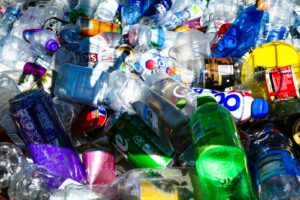Could a global plastics ban tackle the scourge of pollution?
We need a global approach to tackle the scourge of plastic pollution and transform recycling, argues Elizabeth Kirk, professor of environmental law at Nottingham Trent University.
With 89% of the UK population supporting more action to tackle plastics pollution and new draft legislation on plastics introduced to parliament regularly, one might assume that we are well on the way to tackling the scourge of plastics pollution. Indeed these measures not only come on top of successful initiatives such as the 5p plastic bag charge within the UK, but are also seen in other countries. Kenya, for example, adopted legislation banning single-use plastic bags.
These various initiatives may lull us into thinking the problem can be solved through action at the national level. The problem is, however, that elsewhere in the world billions of dollars are being invested in new plastics refineries. While at first sight, we may think any resulting plastic pollution from these new investments is the problem of the countries producing it, there are two key considerations we should keep in mind.
The first is that our global trade system means that plastics are traded between countries. That may be done deliberately in the form of plastic goods and packaging, or unintentionally as microplastics are now found in every part of the world, in soil, freshwater and the sea. These microplastics (which come from, for example, washing clothes, from the normal wearing of vehicle tyres) are found in the water we drink, in marine life we eat and in the air we breathe. It is likely then that some food items imported from other countries will contain microplastics.
The second issue is that the plastics found in the world’s oceans come from every country in the world and so even if we import no goods, the fish we catch may be contaminated with plastics. It is clear that we need a common approach to tackle that pollution.
There are already some international laws that can help us tackle plastics pollution. The United Nations Convention on the Law of the Sea, for example, contains a commitment to ‘prevent, reduce and control pollution from land-based sources’ which covers plastics. More recently the Honolulu Strategy was agreed in 2011 to help tackle marine debris coming from land-based activities. If these commitments were to be fully met, then our plastic problem would be vastly reduced.
There are, however, challenges in implementing these commitments. Chief amongst them is identifying the most appropriate ways to tackle plastics pollution. Should we, for example, focus on increasing recycling? Should we ban further items of plastic, or uses of plastic? Each of these is a possibility, but, as explained below, they are only likely to be effective if there is a coordinated action at the international level.
At present only around 11% of plastic is recycled globally. A very rapid increase in recycling in almost every country of the world would be needed to make this a viable proposition to tackle the plastics problem. Such a significant increase would, however, take a considerable length of time to introduce. It would rely upon a heavy investment to increase the availability of effective and accessible facilities for recycling and in lots of education initiatives to improve public understanding on the need for, and benefits of recycling. A global treaty would help us to coordinate action and share knowledge about how best to improve recycling. Countries already share knowledge about how they meet some treaty obligations through reports to a governing body. A similar approach could be taken in a plastics treaty.
Some single-use plastics could (in theory) easily be banned. Adopting such bans at a national scale carries risks, however. To be effective a ban on, for example, plastic straws would have to stop production in the UK and also imports of straws from elsewhere. A ban on imports of a plastic item by a single State may, however, be challenged by other countries under World Trade Organisation rules. The UK would have to show that the measure was necessary to protect the environment. If the same measure is not being adopted by other States, convincing them that it is necessary will be difficult. Similarly, UK based industries may produce goods for the UK and for export.
On the introduction of a ban on specific goods they would face the choice of switching all production, for example from plastic to paper straws, or maintaining two types of production. Maintaining two production streams is of course more expensive and so this would be problematic. If manufacturers choose instead to change all of their production, they may find that their export market dries up and a new market is needed. Adopting a global treaty where all States agree which items should be banned can help countries avoid these issues of international trade.
There is also reason to believe that a global treaty would be successful. Governments have faced the question of how to tackle a pervasive pollutant produced by all countries before and the answer has been to adopt a treaty. The Ozone Convention adopted in 1985 to tackle the harm to the ozone layer by chemicals used in refrigeration and aerosols is possibly the best-known example. Like subsequent treaties tackling other harmful chemicals, such as the POPs Convention, the Ozone Convention tackled the most harmful first and was designed to enable alternatives to be introduced. Alternatives to harmful oil-based plastics do already exist. These range from alternative materials such as wood and paper to plastics developed from prawn shells and from plants such as seaweed which will degrade more easily.
A global treaty would have another potential advantage. At present any action to clean up plastics already in the environment is dependent on individual actors like Boyan Slat. A new treaty could provide for coordinated action through establishing a clean-up fund to address these ‘legacy’ plastics. The fund could be supported through contributions from importers and exporters of plastics as already happens with importers and exporters of oil who pay into a Fund to address harm from oil spills, or through a tax on oil-based plastics products.
A global treaty would then offer far more in terms of tackling plastics pollution than one single country can do on their own. That is not to say we should stop focussing on developing national legislation, just that we also need to think about action at a wider scale.
















If we get a global treaty it will need to be on the basis of reduce and reuse, not recycle, because of the huge carbon footprint of plastics, even recycled ones. I read that one 500ml drink bottle has a carbon footprint 82 grammes (including all stages from making the plastic to collecting/sorting the empties)
There is already legislation to be approved to ban single-use plastics in the EU. I guess with Brexit it isn’t sure if it will apply to UK. I wonder why this important development is not mentioned in the article.
According to the BBC the European ban won’t come into force until 2021 and only covers “plastic cutlery and plates, cotton buds, straws, drink-stirrers and balloon sticks.” So it’s a typical pathetic EU thing.